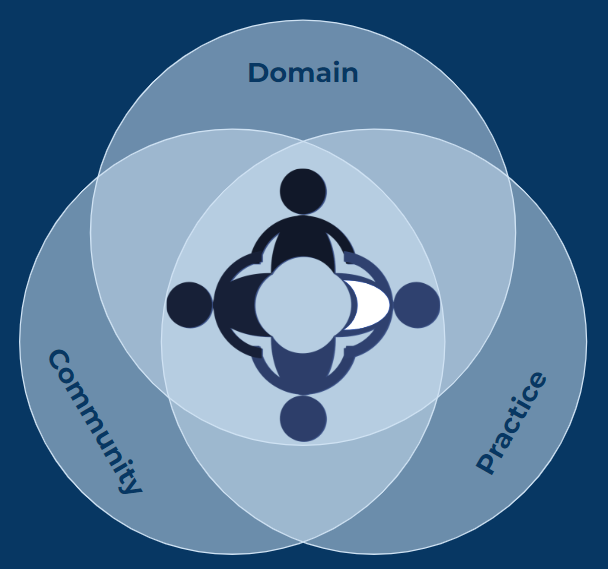A Community of Practice is a "group of people who share a concern or a passion for something they do and learn how to do it better as they interact regularly".1 The term is a relatively new label for something that has been happening throughout human history: a coming together of people with similar or intersecting interests to work towards some common goal.
See below the image for further detail.

|
| Community of Practice © 2022 by T.Briggs is licensed under CC BY-NC-SA 4.0 |
Three key characteristics of a community of practice are domain, community, and practice:
- Domain is a subject or a theme; the connecting interest which provides common ground for members of the community of practice. This may be a job function; a hobby; special interests. Simply sharing in this domain isn't enough for a community of practice to be formed: members must have a particular commitment to that domain.
- Community is the infrastructure or circumstance that brings people together. This could be a shared workplace; a hobby group or club; repeated, chance meetings by, for example, routinely visiting the same café for lunch. Communities may be physically located or, increasingly, digitally enabled, such as those which may grow within fora on interest-based website or social media networks.
- Practice is what people do in order to develop and share their knowledge.
Communities of practice differ from project teams or work departments in that they often form and develop organically rather than being deliberately formed and maintained. Membership is defined by the knowledge and commitment of the individuals, as are the purposes of the community of practice, and both may change as interests do, and as needs dictate. A community of practice may be long- or short-term depending on how long members feel that they have something to contribute to and/or gain from being part of it. Leadership is often non-traditional, being distributed amongst members, with responsibilities emerging as organically as the community of practice itself, rather than being allocated by a manager or other organised leadership body.
Whilst communities of practice traditionally develop organically they can be encouraged into being and fostered by providing the right conditions. That is, if an appropriate domain, community and practices are allowed and encouraged to form, along with the appropriate freedoms required to take part, a community of practice may form around organisational goals.
Whilst it is possible to delve deeply into theories surrounding Communities of Practice, in our case it is enough to understand them as working groups in which participants share information and experiences on a particular subject or theme with the intention that members will learn from each other and develop themselves professionally and personally.
In terms of digital work, this may be in the form of a forum or meeting group (either online or offline) which allows people completing similar work to experiment, explore and share good practice regarding the use of digital tools and technologies to improve the efficiency of their daily work. Whilst not specifically a "digital skill", many digital tools can help communities of practice form, operate and thrive in different ways to offline-only communities of practice.
Next Steps:
- Think about groups that you may either have taken part in in the past, or currently belong to. Which of these show the hallmarks of a community of practice?
- Remember that these may be official, purpose-built work groups, or they may have grown organically. They may even be organic subgroups existing within one or crossing between multiple 'official' groups.
- It may help to think about the community definition and examples above. Do you belong to and take part in such a community?
- See if you can identify the domain, community and practice aspect of these groups. You may have already identified the community when identifying your community of practice.
Further Reading:
- In the Glossary: Digital Skills
- Elsewhere online: Community of Practice (Wikipedia)
Comments
Post a Comment